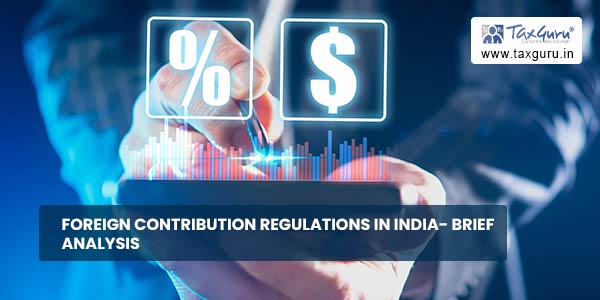Introduction:
The Foreign Contribution (Regulation) Act, 2010 is an act of parliament of India, by the 42th Act of 2010. It is a consolidated act whose scope is to regulate the acceptance and utilization of foreign contribution or foreign hospitality by certain individuals or association or companies and to prohibit acceptance and utilization of foreign contribution or hospitality for any activities detrimental to the national interest and for matters connected therewith or incidental thereto. It is designed to connect shortfalls in the predecessor act of 1976. The bill received presidential assent on Sept. 26, 2010.
What is Foreign Contribution?
As defined in sec. 2(1)(h) of FCRA, 2010, “Foreign Contribution” means the donation, delivery or transfer made by any foreign source,-
- Of any article, not being an article given to a person as a gift for his personal use,
- Of any currency, whether Indian or Foreign,
- Of any security as defined in clause (h) of sec. 2 of Securities Contract (Regulation) Act, 1956 and it includes any foreign security as defined in clause (o) of Sec. 2 of Foreign Exchange Management Act, 1999.
Who can receive Foreign Contribution and who cannot as per FCRA, 2010
A person as defined in sec. 2(1)(m) with the exclusion of those mentioned in sec. 3 of FCRA, 2010, having a definite cultural, economic, educational, religious or social program can receive foreign contribution after it obtains the prior permission of Central Government or gets itself registered with Central Govt.
However, the following person cannot receive foreign contribution directly or indirectly:
- Candidate of election.
- Any Media House or media person.
- Judge or Govt. servant.
- Member of legislature.
- Political party or any organization of political nature.
How to get Foreign Contribution?
There are two ways of obtaining permission to receive such contribution either you have to take FCRA registration or you have to take Prior permission under FCRA.
Criteria under FCRA Registration
- The association shall be registered under existing law for ex. Societies Registration Act, 1860 or Companies Act, 2013 (Sec. 8 Companies)
- It shall be in existence for at least 3 years and shall have spent at least 1500000 during the last three years for the purpose of definite cultural, economic, educational, religious or social program.
- It must not have been convicted or prosecuted for an offence under any statute.
Criteria under prior permission
- A person who seeks foreign contribution should be registered under the existing statute such as the Societies Registration Act, 1860 or the Indian Trust Act, 1882 etc.
- A commitment letter should be submitted from the donor on which contribution amount and its purpose shall be specified.
- It must not have been convicted or prosecuted for an offence under any law.
Application Procedure
In order to apply:
1. Form FC-3A for registration and form FC-3B for prior permission has to be submitted online;
2. A fee of Rs. 10000 in case of registration and Rs. 5000 in case of prior permission needs to be submitted;
3. It is mandatory to have a FCRA Bank Account with SBI, AADHAR No. and DARPAN ID.
This registration will be valid for the term of five years and it can be renewed before 6 months of expiry of such term in form FC-3C.

Compliances related to Foreign Contributions
1. Maintenance of records and accounts is necessary.
2. Submission of Annual Return in form FC-4 with the balance sheet and statement of receipt and payment account certified by a CA online by December 31 every year.
3. Submission of Nil return is necessary even though there is no receipt or utilization of foreign contribution.
When is a registration suspended or cancelled?
The MHA can inspect the accounts of associations and if it receives any adverse input against the functioning of the association, the MHA can suspended the FCRA registration initially for 180 days. The association will not be able to receive any fresh donation and also can’t use more than 25% of the amount available in the bank account without the prior permission of MHA.
The MHA may cancel the registration of an organization which would not be eligible for registration or grant of prior permission for 3 years from the cancellation date.
What was the need for Foreign Contribution Regulation in India?
The annual inflow of Foreign Contributions had doubled in the last decade or so, but various recipients of foreign contribution didn’t use it for the purpose for which they were registered or granted prior permission. Therefore to regulate it, it was necessary to introduce Foreign Contribution Regulation in India.
Further, to ensure that such contributions don’t affect the internal security of the country negatively and the regulations were brought in to enhance transparency and accountability in the receipt and use of foreign contributions.
Conclusion
As specified above, in order to ensure that foreign contributions don’t affect the internal security of the country negatively and to enhance transparency and accountability in the receipt and use of foreign contributions, the regulations were brought in. However, excessive regulations can affect the functioning of NGOs across the country. The foreign contribution regulations should not affect the sharing of resources across borders which is necessary for the functioning of the global community.




